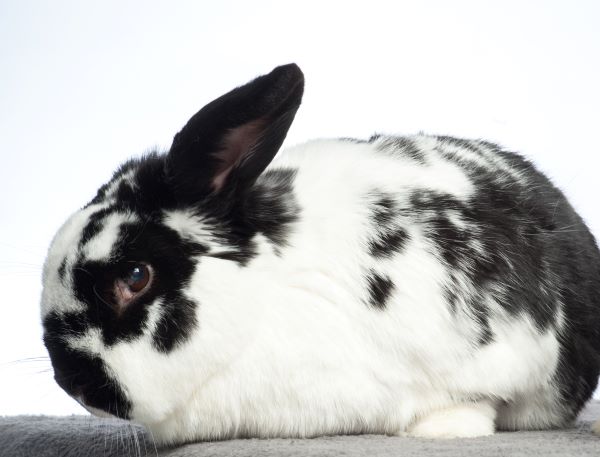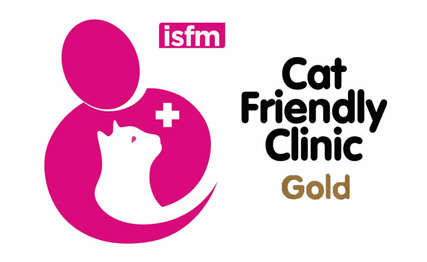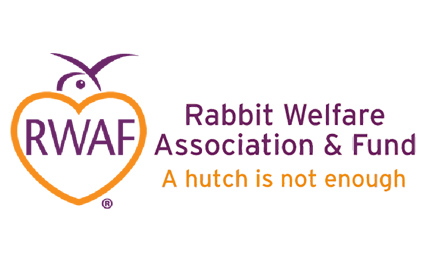24 hour contact: 020 7387 8134
Rabbit Vet Services

At the RVC's Beaumont Sainsbury Animal Hospital and vet practice, you can be reassured that you are getting exceptional rabbit vet knowledge and expertise.
Rabbits are the UK’s third favourite pet. Due to their size and quiet nature, they can often be seen as an ‘easier’ option when it comes to looking after by pet owners. This is a misconception and rabbits also need as much looking after as other domestic pets, such as cats and dogs. Our team have had specialist rabbit vet training and extensive rabbit care experience so from the day you get your rabbit and throughout its lifetime - we can support and advise you every step of the way.
Prestigious RWAF Gold Award Status retained 2025
We are very proud to have been re-awarded the Gold Standard accreditation by the Rabbit Welfare Association Fund (RWAF). We are the only London vet to hold this award - RWAF's highest possible endorsement 
What does this mean for you and your pet rabbit?
- our hospital has appropriate equipment and is ‘rabbit friendly’ and as well as fully trained staff for rabbit health/welfare
- we have a 'Rabbit Advocate' who addresses specific rabbit-related needs and issues within our practice
- our specialist hospital ward is dedicated to rabbits (and other prey or herbivorous species)
- we have a rabbit-friendly waiting room and the ability to hospitalise your rabbit in a low-stress environment.
Award-winning rabbit veterinary professionals
In 2021 Dr Nadene Stapleton was awarded “UK Rabbit Vet of the Year” at The Burgess Excel Vet Awards, thanks to her outstanding contributions to rabbit health and welfare. We also won “Best Rabbit Practice of the Year” at the same awards, after receiving multiple nominations from clients and the public. Nominees were based on the practice delivering exceptional rabbit and client care as well as championing best practice in rabbit welfare.
Rabbit Healthcare Tips
Rabbit Neutering
- We recommend spaying of female rabbits from five months of age in order to prevent unwanted litters, aggressive behaviour and most importantly uterine adenocarcinoma (cancer). Up to 80% of unneutered female rabbits have been found to suffer from this painful fatal condition which will be totally prevented by spaying
- We recommend castration of male rabbits from four months of age in order to prevent fighting, urine spraying, breeding and other undesirable behaviours
Rabbit neutering prices start from £180 (Prices as at August 2024)
Click here for more details about rabbit neutering >
Rabbit Vaccination
- Vaccination is recommended in all rabbits whether kept outside or inside in order to prevent Myxomatosis and Rabbit Viral Haemorrhagic Disease (RHD 1 and 2) which are very infectious and potentially fatal conditions
- Rabbits should be vaccinated with the combined vaccine from 5 weeks of age and will need yearly booster vaccinations
Click here for more details about rabbit vaccinations
Parasite treatment in rabbits
Rabbits do not usually need regular worming treatment but may need treatment for other parasites including fleas.
Rabbits may pick up fleas if they are given access outside or if they are in contact with dogs or cats which go outside. Fleas carry diseases such as myxomatosis so treatment is important to prevent the spread of disease. Imidacloprid is the only licensed flea product for rabbits and will prevent fleas for one-week post-application
Flystrike in rabbits
Flystrike is a potentially fatal condition caused by flies laying eggs on your rabbit (usually around their back end or any warm moist areas). These eggs then develop into maggots which rapidly cause tissue damage and death. We recommend checking your rabbit every day for flystrike, particularly during warm periods. Preventative treatment with cyromazine may be necessary at high-risk times. One treatment will help prevent flystrike for 8-10 weeks in combination with environmental control of flies.
Rabbit dental checks
We recommend dental checks every 6 months for pet rabbits as dental disease is such a common problem and more easily treated if detected at an early stage – you can register for automatic reminders.
Rabbit fact care sheets - Click on title to view/download
- Caring for and feeding your rabbit
- Converting rabbits to hay
- Indoor rabbit care
- Providing enrichment for your rabbit
- Rabbit Hand rearing guide
- How to reduce the risk of gut stasis in rabbits
- Rabbit bonding guide
- E. cuniculi infection in rabbits
- Myxomatosis in rabbits
- Pasteurella infection in rabbits
- Rabbit viral haemorrhagic disease (RHD 1 & 2)
- Flystrike in rabbits
- Rabbit obesity and how to avoid it
- Sludgy bladder syndrome in rabbits
Resources/useful links
RVC Research about rabbit health
Conformation‐associated health in pet rabbits in the UK: A VetCompass cohort study (2024)
Effects of theatre temperature on body temperature during anaesthesia in domestic rabbits (2022).
Risk factors for tear duct inflammation (dacryocystitis) in rabbits (July 2022)
Most common pet rabbit health issues research (Oct 2019)
Rabbit Lifespan and mortality research (Oct 2019)



